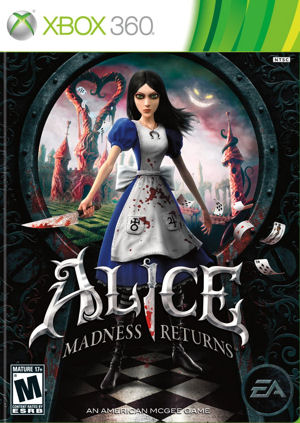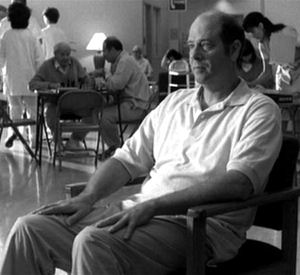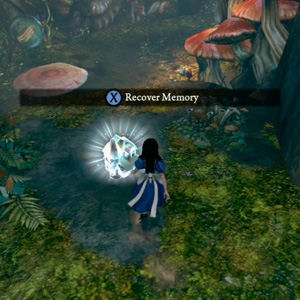A Skeptic's Take on Alice: Madness Returns
 | | Not the Wonderland you remember |
In the video game Alice: Madness Returns, last month's sequel to American McGee's Alice, you play as Alice Lidell, the fictional protagonist from Lewis Carrol's famous novels Alice's Adventures in Wonderland and Through the Looking-Glass. Apparently, after the events of the novels, Alice's house burned down with her family in it, leaving her the sole survivor of the tragedy. After spending some time in an asylum, she has attempted to deal with her trauma by living in an orphanage and seeing a psychiatrist, Dr. Bumby. Dr. Bumby's chosen therapy involves memory inhibition, the notion that you can selectively forget the things that are causing you stress. Though the therapy seems to be working, Alice suddenly finds herself traipsing once more through a twisted Wonderland--which is now understood to be a mental construct--looking for clues that may reveal truths about the terrible fire that has destroyed her mind. This whole tale appears to hinge on certain beliefs most of us have about memory, specifically that it can be repressed. However, a quick glance at the scientific literature will reveal that memory probably doesn't work that way.
In the late Nineteenth Century, Sigmund Freud began developing his ideas about psychology, which would form the basis of psychoanalytic theory. According to Freud's suppositions, most (if not all) major psychological disorders can be explained as the result of repressed trauma, usually childhood sexual abuse. The idea is that the mind pushes disturbing memories deep into a person's psyche, where unconscious processes wreak havoc on the conscious mind, resulting in disorder. Though nearly all of Freud's ideas have been disproven by science, the underlying notion--that there is an unconscious mind where memories can be locked away--remains popular with everyday people.
There is plenty of evidence to support the existence of unconscious cognitive processes, even unconscious memory. For example, there has been a good deal of research into implicit memory, in which previous experiences aid in the performance of a task. Fans of the film Memento should be familiar with the distinction between implicit and explicit memories, because the protagonist, Leonard Shelby, is unable to develop new explicit memory but is capable of developing new implicit memory. He explains how this works while telling the story of Sammy Jankis. As Leonard explains, the most obvious form of implicit memory is procedural memory, which is what allows us to repeat a common task without thinking about all that goes into it, such as riding a bike or giving your wife her daily dose of insulin.
 | | Poor Sammy |
However, the evidence for repressed trauma, specifically repressed childhood abuse, is much less compelling. Starting in the mid-eighties, there was a rash of people reporting repressed sexual abuse after therapists and group counseling sessions started "recovering" lost memories. In a handful of these cases, corroborating evidence was found that supported the stories, but for the rest, there was nothing to go on except allegedly recovered memories. Despite this paucity of evidence, people were jailed, jobs were lost, and families were torn apart, all on the sole basis of wild accusation.
This was a boon for daytime talk shows, self-help gurus, and pop psychologists, but by the mid-nineties, real psychologists began pushing back. They explained that memories are far more inaccurate and maleable than people like to think, and through the process of confabulation, a person can form false memories that are indistinguishable from true ones. In high-pressure environments like group sessions where you are the only one who hasn't yet "remembered" being abused or a psychologist's office where you are being hypnotized to learn the hidden secrets responsible for your anxiety disorder, it's remarkably easy for the brain to manufacture a story that will satisfy deep, psychological incentives. Thanks to these psychologists explanations, it wasn't long before the accused began winning lawsuits of their own, and by the turn of the century, the modern-day witchhunts had come to an end.
Still, what are we to say about the handful of cases where a person "recovered" lost memories and then, afterwards, evidence was found that supported the story? In order to explain these instances, one needs to understand that the brain encodes events so that they can be remembered later. When that encoding mechanism is compromised, either because it is not fully developed or as the result of physical trauma, fully detailed memories will not be formed. When this happens, it is possible to form vague or sporadic memory, with tiny pieces of information hidden in vast swaths of amnesia. This is how most of us remember our early childhoods, through a handful of oddly specific events, details, and sensations. Confabulation fills in the gaps, allows us to connect these disparate elements into a cohesive narrative of our past that need not be veracious. The problem is that, in the absence of corroborating evidence, it is impossible to tell the difference between a confabulated memory and an accurate one. What we must remember--and how this relates to those stories of recovered memories that proved to be accurate--is that a confabulated memory isn't necessarily a false memory; sometimes, through sheer chance and the law of large numbers, we just happen to fill in the gaps with accurate details.
 | | In video games, it's as easy as a single button press |
In each chapter of Alice: Madness Returns, Alice revisits a memory of what happened on the night of the fire. In it, she closely examines the details of her memory and deduces certain facts about them. For example, though the official story claims that Alice's cat, Dina, started the fire by knocking over a lamp in the living room, Alice remembers that Dina was sleeping in her room and that she had taken the lamp upstairs before going to bed. She is then forced to construct a narrative of what really happened, which is a fairly accurate example of how memory works. The only problem is that it implies that the process of constructing a narrative out of unclear memories is inherently logical and conclusive, which it definitively is not. Alice could have been remembering a completely different night in which she took the cat and lamp upstairs, confusing it with the night of the fire, in which she might have acted differently.
Again, it is important to note that you can't tell the difference between an accurate memory and a confabulated one. We get into trouble when we assume that we can parse out the accurate details, discard the bad ones, and then use reason to put it all together. This is what therapists in the early eighties tried to do, leading to the recovered memory scandal. In actuality, what you wind up doing in these cases is accelerating the process of confabulation, sometimes discarding the accurate details in favor of fictional ones and building a narrative that, while untrue, seems completely real and plausible. Those who have the rebuilt narrative will believe it as surely as you believe your memories, which is why they are willing to accuse their loved ones of abuse that never actually happened.
According to the consensus of modern science, therefore, memories aren't repressed and cannot be recovered in any reliable way. In Alice: Madness Returns, though, there is the added consideration of Dr. Bumby attempting to actively erase Alice's past from her mind. Memories can't be repressed or recovered, but can they deliberately be removed?
 | | There are some things about Jim Carry I wish I could forget |
According to a recent study, it does seem to be possible to force your mind to inhibit information, and according to brain imaging scans, the process of inhibiting memory is similar to inhibiting motor movement. However, the study only used neutral information, since traumatic or important information would be much harder to suppress. This is a very early stage of research that has not yet been replicated, meaning we are pretty far from making valid conclusions and even further from things like Eternal Sunshine of the Spotless Mind. It does seem at least possible that memories can be inhibited to some extent. Dr. Bumby's therapy of Alice, though, is unlikely to produce any lasting results.
The bottom line is that most of us have an extremely outdated sense of how memory works, and that is reflected in popular culture. Though Alice: Madness Returns does demonstrate the narrative nature of memory, it clouds it in defunct psychoanalytic notions of memory repression and recovery. It also makes a few false implications about how we reconstruct our past and neglects to acknowledge the extremely important side effects of confabulation. We don't like to think that our memories are as fallable as they are, and so we probably won't see more accurate popular representations out there in the foreseeable future. Given that, I recommend Alice: Madness Returns to those readers out there who happen to be gamers; it's a fun ride.
-e. magill 7/26/2011
|
|